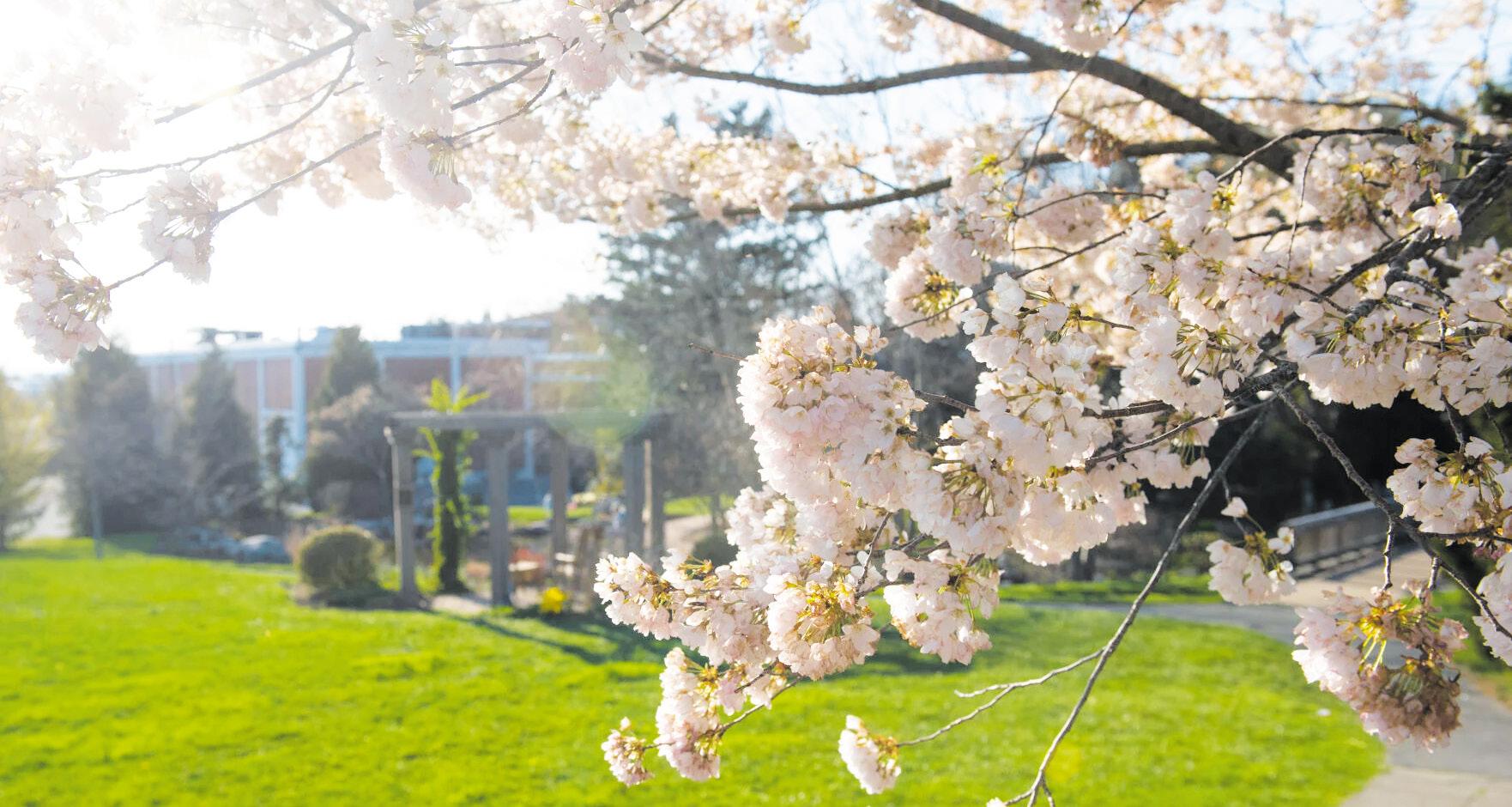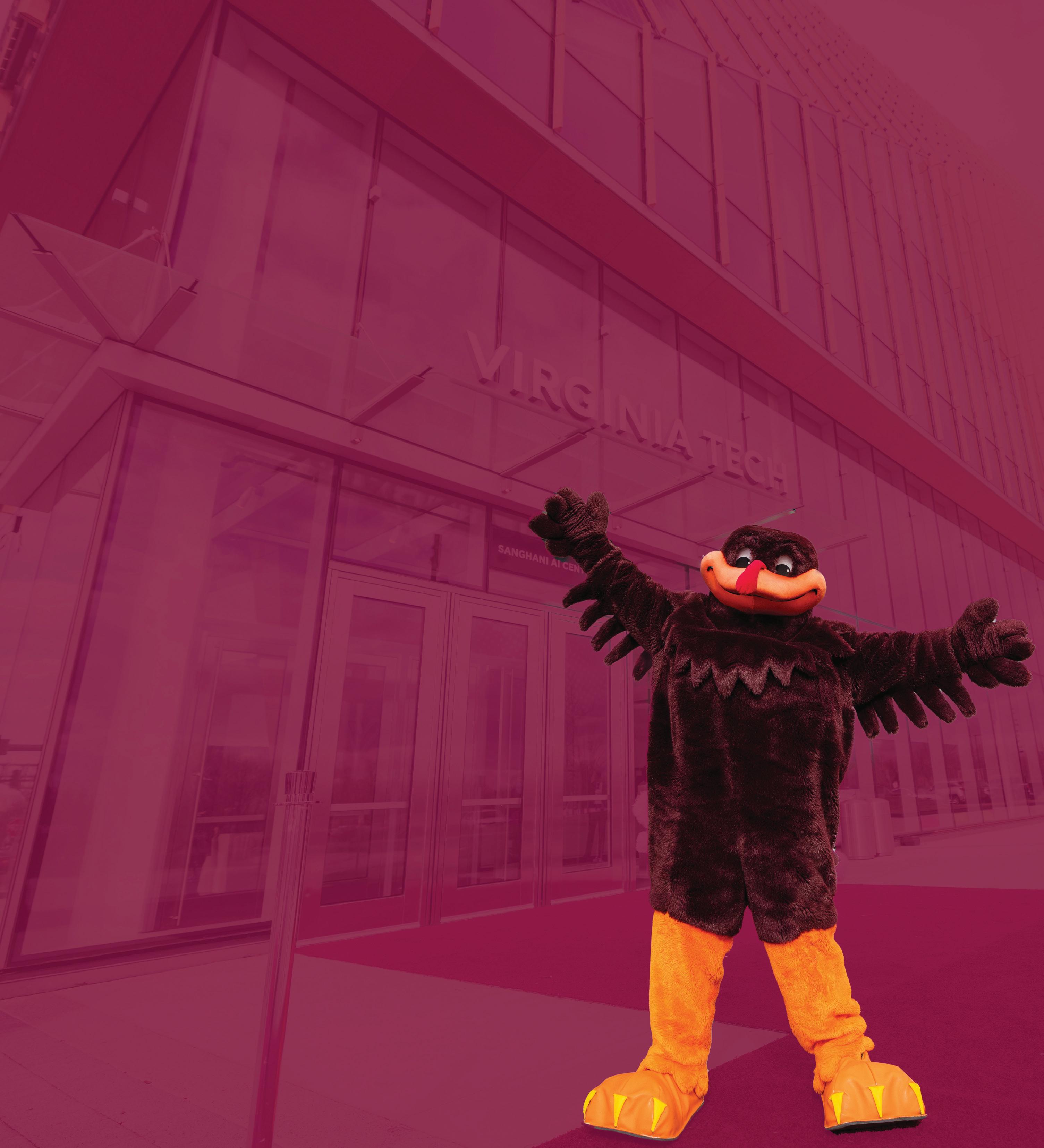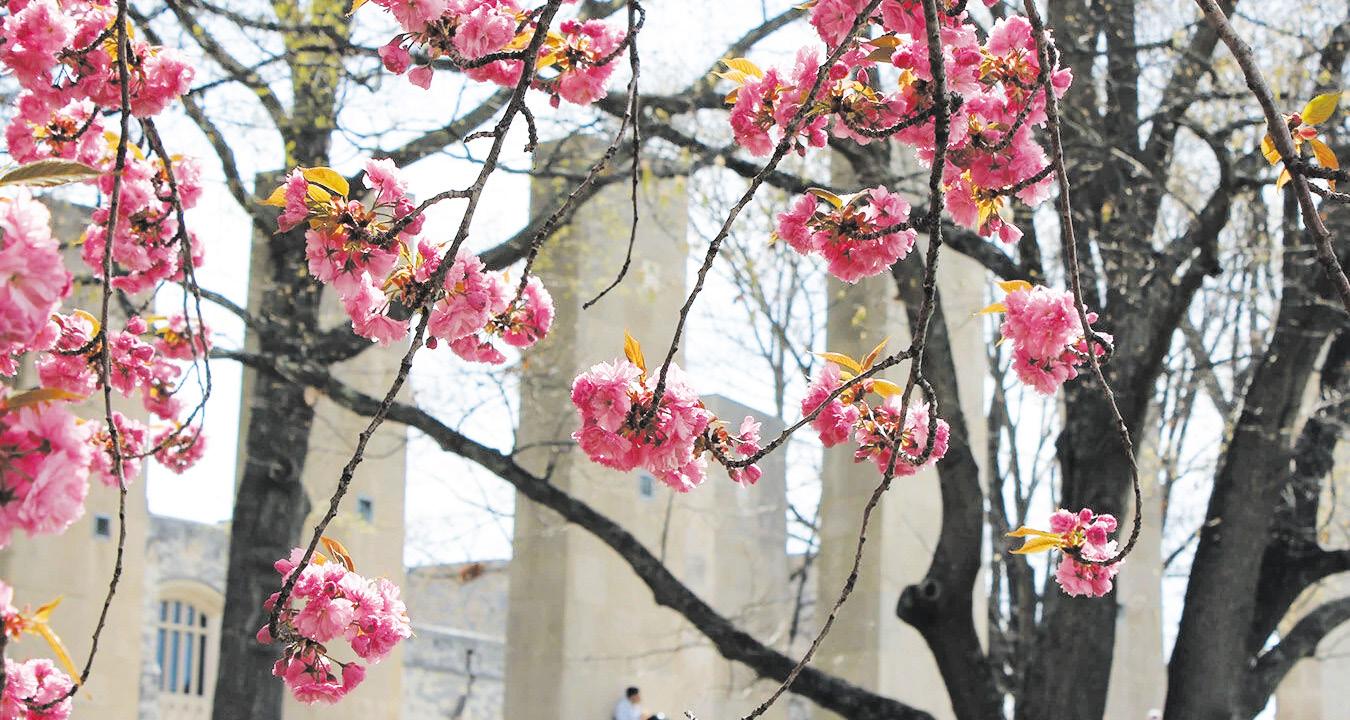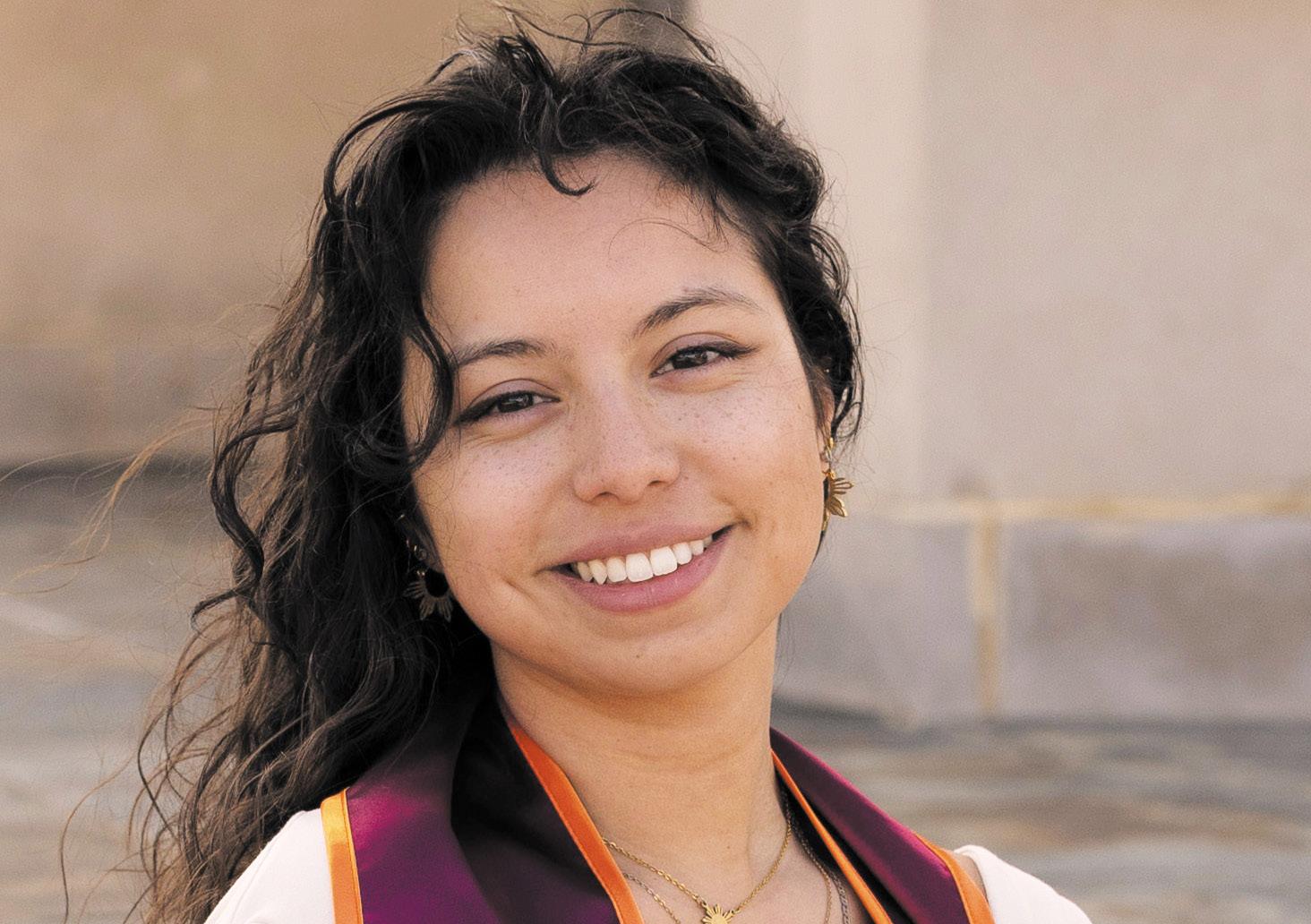












Emanda Seifu | managing editor
Managing editor Emanda Seifu reminisces on her four years at the Collegiate Times.
For the past four years, the Collegiate Times (CT) has been a constant during my time at Virginia Tech and a source of comfort. There truly is no way to talk about my undergraduate journey without the CT being intertwined in my story. After having been a part of my high school newspaper as editor-in-chief, I knew that I wanted to carry my love of journalism and the community it comes with into college.
The opportunity came in the form of Gobblerfest, where I was immediately surrounded by the joy and liveliness of the editors who were sharing their experiences and what it means to be a part of the CT Staff. I promptly became a member of the lifestyles staff as a writer, and soon after that I joined the editorial staff as a lifestyles assistant editor, which had me participating behind the scenes in production.
Here I found that final piece of the puzzle — I quickly found myself immersed in the organization and never looked back. If I had to describe the energy of the CT
Impartiality means reporting, editing and delivering the news honestly, fairly, objectively and without opinion or bias.
Credibility is the greatest asset of any news medium, and impartiality is the greatest source of credibility.
To provide the most complete report, a news organization must not just cover the news, but uncover it. It must follow the story wherever it leads, regardless of any preconceived ideas on what might be most newsworthy.
The pursuit of truth is a noble goal of journalism. But the truth is not always apparent or known immediately. Journalists’ role is therefore not to determine what they believe at that time to be the truth and
production, it would be a creative storm with chaotic bursts of laughter, inspiration and collaboration. On any given Sunday, there is some random new piece of information that I’m learning which has me looking forward to production week by week.
This ever-so-steady spirit was an important part of my experience, so I worked to translate that same drive into the lifestyles section when I became the section editor. With the help of Michaela Scott and Emy Delaporte (the most amazing assistant editors I could have asked for), the lifestyles section grew stronger and more vibrant. With the growth of the staff came a creative growth that brought unique and talented writers whoshowcased beautiful pieces each week in the publication. Even though I have moved away from lifestyles, there is always a sense of nostalgic excitement I feel whenever I am reading a piece from the section.
This past year as managing editor
reveal only that to their readers, but rather to report as completely and impartially as possible all verifiable facts so that readers can, based on their own knowledge and experience, determine what they believe to be the truth.
When a news organization delivers both news and opinions, the impartiality and credibility of the news organization can be questioned. To minimize this as much as possible there needs to be a sharp and clear distinction between news and opinion, both to those providing and consuming the news.
Voice your opinion. Send letters to the Collegiate Times. 365 Squires Student Center Blacksburg, VA, 24061 opinionseditor@collegiatetimes.com
All letters must include a name and phone number. Students must include year and major. Faculty and staff must include position and department. Other submissions must include city of residence and relationship to Virginia Tech (i.e., alumni, parent, etc.). We reserve the right to edit for any reason. Anonymous letters will not be printed.
Letters, commentaries and editorial cartoons do not reflect the views of the Collegiate Times. Editorials are written by the Collegiate Times editorial board, which is composed of the opinions editors, editor in chief and managing editors.

Flowers beginning to bloom in Hahn Horticulture Garden, April 11, 2021
has been an honor that I have enjoyed immensely. Having the opportunity to learn about all the varying pieces of the publication on a more technical level has provided me with some of the most valuable experiences and skills that I continue to apply in all aspects of my life.
I am especially grateful to our editor-inchief, Victoria Weber, for making the transition so seamless and continuing to be a point of support that I have been able to rely on throughout this year.
As a student in the College of
NEWSROOM
Engineering, the CT has been a breath of fresh air that provides me with a creative outlet that differs from day to day in my major. I am deeply grateful for all the memories that have come from Squires Room 365 and will not soon forget them.
Much love, Emanda

231-9865
Editor-in-Chief: Victoria Weber (editor@collegiatetimes.com)
Managing editor: Emanda Seifu
Design editor: Annmarie Leake
Assistant design editors: Caroline Rogers and Sarah Jordan
Copy editors: Riley Vinluan, Emily Southern and Allyson Welmaker
News editors: Ayisha Surani and Erin Bailey
Lifestyles editors: Emelia Delaporte, Michaela Scott and Emma Duncan
Sports editors: Sam Mostow, Thomas Bray and Dylan Tefft
Opinions editor: Jenna Mason
Assistant opinions editor: Mohib Amjad
Photo editor: Hamad Alhendi
Assistant photo editor: Maddy Djuric
Have a news tip? newstips@collegiatetimes.com
BUSINESS STAFF
Business manager: Viktor Fedotov (business@collegemedia.com)
231-9860
MEDIAMATE 888-897-7711 collegiatetimes.com/media_kit/ orders@mymediamate.com
The Collegiate Times, a division of the Educational Media Company at Virginia Tech, was established in 1903 by and for the students of Virginia Polytechnic Institute and State University. The Collegiate Times is published every Tuesday of the academic year except during exams and vacations. To order a reprint of a photograph printed in the Collegiate Times, visit reprints.collegemedia.com. The Collegiate Times is a division of the Educational Media Company at Virginia Tech, Inc., a 501(c)3 nonprofit with a mission to provide educational experience in business and production of mass media for Virginia Tech students. © Collegiate Times, 2020. All rights reserved. Material published in the Collegiate Times is the property thereof, and may not be reprinted without the express written consent of the Collegiate Times.
Advertisements do not necessarily reflect the opinions of the Collegiate Times. Read about our organization’s Core Values online at collegiatetimes.com.
Emelia Delaporte | lifestyles editor
Lifestyles editor Emelia Delaporte closes out a series of letters to freshmen with a goodbye.
Dear Freshman,
I don’t know where to begin. This is my fourth and final letter, and my last print piece in the Collegiate Times. Instead of dispensing advice, I’ll be spending this issue to reflect on my time with the CT and hope that it might convince you to pay more attention to the work that we do, the landscape around us and maybe even to contribute to the paper during your time at VT.
My passions
If you know me, you can probably guess that a lot of my time spent writing for the CT has been (in part) an excuse to do the things that I already want to do. I have spent a lot of time driving around the region so I have something to write about, though I probably would have done it anyways. It has been the best possible reason to learn about the area.
I have long harbored a feeling that many students at VT fail to look beyond what exists within the confines of Blacksburg and Christiansburg. This is a disappointing phenomenon that I have often equated to the idea of being stationed in Germany and never leaving your military base. It only took me a couple of months on the ground here in Blacksburg to become aware of these tendencies, and I have been engaged in an unapologetic crusade since then to dispel notions of the area being boring, a sentiment that I have often heard that could not be further from the truth. If you think the area around Blacksburg is boring, you are absolutely looking at things the wrong way — or at least looking in the wrong places.
My travel articles for the CT have taken me to many of our neighboring towns, counties and cities. I have visited the communities of Draper, Dublin and Pulaski in Pulaski County; toured historic sites in Saltville and Abingdon in Washington County; written about bluegrass concerts in Radford (and spent a lot of time at Arabica Cafe & Bakery); spent a day driving around Bland County and spent many weekends in Floyd, a couple of which have
spurred ideas for articles.
I have especially loved my time in Giles County. Its small towns have seen me through big moments — teaching myself to float in Wolf Creek in Narrows, having a last meal with my sig-o in Eggleston before he left for three months in Wyoming, documenting Hurricane Helene’s impacts along the New River on Goodwins Ferry Road, discussing the controversial Mountain Valley Pipeline with members of the historic village of Newport, passing midnight on my 21st birthday in Glen Lyn, sipping tea and slipping on ice in Pearisburg and of course, hiking the Cascades in Pembroke. There are too many memories to recount them all. Suffice to say, Giles is a special place — and the paninis at Sugar Mountain Bakery in Rich Creek are really good.
My travel articles have also taken me to the cities of Princeton and Bluefield in Mercer County, West Virginia, and to the wildernesses and small towns around and in between them. I’ve written about what I’ve seen in Bristol, walking the street on both the Virginia and Tennessee sides. In two of my favorites, I was able to share my experiences from studying abroad in Panamá in January 2023 and from road tripping to Kentucky over spring break 2024 to see where my favorite musician’s ashes were scattered, just down the Green River from the inspiration of one of his most famous songs. Rest in peace, John Prine.
The Collegiate Times has also given me a good reason to listen to a lot of music, over and over again. When I have been unable to travel, I have enjoyed writing album reviews, and this busy semester has sent a lot of them from my car radio to our website. I will miss the sense of action that came with an album release. Maybe now I’ll simply listen and not critique — although that is unlikely.
The third and arguably most important passion that the Collegiate Times has allowed me to tap into is ecological preservation, conservation and recreation. I did not write about as much of this as I would have liked, perhaps as a consequence of my local involvements creating many conflicts of interest, but the weeks where I did
meant a lot to me.
Though the dream of being a conservation-oriented communicator hasn’t panned out for me just yet, I’m holding out hope. I also have hope for the work of the New River Conservancy, the New River Land Trust, our very own College of Natural Resources and Environment and ardent, fervent hope for the community organizers who rally each weary morning to try to protect and advocate for native species, healthy waterways and natural landscapes. I see, sympathize with and believe in you.
The Collegiate Times has facilitated community for me in four ways. My communications and English classes hold the familiar faces of fellow staff writers, something I am eternally grateful for when presentations and group discussions roll around. Sunday production meetings allow me to engage with other sections and my co-editors, laughing, planning and occasionally scheming. EMCVT meetings have given me a chance to work with our outgoing editor-in-chief, Victoria, on the unseen and underappreciated side of things. I have always appreciated you, and hope that you know that and know your worth.
The lifestyles section has transformed vastly over my three and a half years in it. I joined in January 2022 as a contributor, became assistant editor in February 2023 and became editor in January 2024. Our culture has shifted immensely, mostly because we developed one where I didn’t feel we had one before. Each weekly meeting starts with highs, lows and buffaloes, which takes longer but has created bonds between each of our staff that I would not have anticipated a couple years ago. We know one another deeply, even if only for an hour a week. Thank you for being such a rewarding, talented group of people to lead. I am so lucky, and so proud.
I would be remiss if I did not mention Michaela and Emma, who have led the section alongside me. They are bright
and competent women and I am better for having known them. Mickey, who has become one of my best friends, will serve as next year’s editor-in-chief. The Collegiate Times is lucky to have her. Emma is continuing on at the helm of lifestyles, bringing in the next generation of leaders in the form of our new assistants, Cat and Ella.
Rivers and roads, rivers and roads…
It has been a blast, to say the least. I hope that something that I have written has meant something to you, and that maybe you’ll be more inspired to leave campus (or your Billboard Top 100 playlist) because of my efforts. Maybe you’ll be inspired to join the Collegiate Times so you can spend a few hours a month making a difference. Come find us at Gobblerfest in the fall.
It’s a small point of pride to mention that this piece will be my 46th full-length lifestyles byline, tying me for 5th place for most bylines by a lifestyles member in the last decade. Just a goal I had set a couple years ago and completely forgotten about until December (which explains why I wrote so much this spring).
I’ll leave you with some food for thought, excerpted from the foreword of A Sand County Almanac by Aldo Leopold in 1948. Virginia Tech as a concept was introduced to me by two counselors from the camp where I first heard of this book, so it’s only fitting.
“That land is a community is the basic concept of ecology, but that land is to be loved and respected is an extension of ethics. That land yields a cultural harvest is a fact long known, but latterly often forgotten… Perhaps such a shift of values can be achieved by reappraising things unnatural, tame, and confined in terms of things natural, wild, and free.”
Love, Graduate


Class of 2025, today we celebrate your achievements, your perseverance, and the incredible journey that has brought you to this moment. You have faced challenges with resilience, embraced opportunities with determination, and contributed to the Virginia Tech community in ways that will leave a lasting legacy.
As Virginia Tech pushed the boundaries of discovery and innovation across the commonwealth and beyond, you played an integral role in shaping the future of our university. The knowledge, skills, and experiences you have gained will help shape your future endeavors as well. Greet the challenges and opportunities ahead with courage and optimism, knowing that you are fully equipped to succeed. As you enter the next stage of your life, lead with integrity, serve with compassion, and continue to push the boundaries of what’s possible.
Carry your Hokie spirit with pride wherever your path leads, and know that you will always have a home here in our community.
Congratulations, Class of 2025! The future is yours.
Tim Sands, President
Victoria Weber | editor-in-chief
The editor-in-chief details her journey from news writer to EIC to graduate.

school newspaper. The CT, however, was a whole different beast. Working as a news writer at a university with 36,000 students, and an even larger community, pushed me in ways I had never felt challenged before. I remember once going to an early morning trial at the Montgomery County Courthouse in Christiansburg as a backup reporter for an article. Having left my phone with a friend, I had to navigate the bus system as a newly minted freshman without the help of the Blacksburg Transit app to get to the courthouse and then proceeded to walk another mile or so in ill-fitting heels because of a missed stop. If I were being dramatic, I might say I bled for the CT.
this is the only written record of “me” at the Collegiate Times, but I hope the many decisions I have made preserve another kind of memory here. Above all, I like to think I left the CT better than I found it.
While these past four years have held so much happiness, wonder and discovery for me, there have also been hard times and struggles. As such, I must acknowledge those I absolutely could not have done this without.
There are many things I owe the Collegiate Times. Until this semester, it felt like there would never be a “post-CT” period of my life. I am not sure how many hours I have spent writing news articles, conducting interviews, holding weekly meetings, attending productions, hosting CT events, filling out forms, updating (and forgetting to update) newsletters, editing stories, finalizing layouts and countless other tasks that have added up to some surely-not-insignificant amount of time. And, upon graduation, those tasks that have filled my to-do list alongside class assignments and work deadlines suddenly cease to exist. It feels astonishingly odd to say goodbye to my fellow CT members, to the people I owe so much to. There are so many things to say about the wonderful writers, editors, photographers, designers, business and social media managers, and many others who are a vital part of producing local journalism, but most of all, they never cease to amaze me in all they do and aspire to be. One is never without good company in the
newsroom.
Serving as editor-in-chief has brought me so many opportunities and learning experiences. I came to Virginia Tech having already set my sights on joining the CT the very second I set foot on campus. However, the idea of becoming EIC, something I wanted so badly even as a freshman, felt so far away and impossible. Through changing majors, internships and jobs, and becoming something resembling an adult, the CT has remained a significant part of my life throughout the past four years. These are my people, and it is so hard to leave them behind. But I’m confident I’m leaving them in good hands. Our incoming editor-in-chief, Michaela Scott, has proven herself time and time again to be an ambitious, accomplished leader, and I have the utmost faith in her not only to maintain the CT’s role in the local community, but to transform it into the complete innovative force it is capable of becoming.
I started at the CT as a news writer with four years of experience writing for my high
Taking on managerial responsibilities as a news editor, managing editor and, of course, EIC was not entirely smooth sailing, but doing so was worth every minute. Seeing writers and editors morph into professional, self-possessed individuals is a reason in itself to join the CT. It is truly a magical thing to pause during Sunday productions and watch everyone as they settle into “the zone,” a kind of unanimous devotion to producing the best work possible for our beloved newspaper.
In becoming EIC, I’ve been further surrounded by wonderful creatives and leaders who make the Educational Media Company at Virginia Tech what it is. To Emy, Will, Viktor, Kate, Kayra, Lindsey, and of course, Amy, you are some of the finest people I have ever met, and I look forward to joining the alumni association that Emy eventually creates in her refusal to sit still.
It feels like it’s been forever since I last wrote an article for the CT, and so much stranger to use first-person in an article. Much of my experience as a news writer has required removing as much of myself as possible from reporting, so perhaps this is making up for a thousand “I”s that were omitted when transcribing notes and writing articles. Perhaps
To my wonderful mother, Christine Rupert Ross: thank you for bestowing upon me the honor of becoming the first person in your family to both attend and graduate college. None of this would have been possible without your fierce determination and unwavering confidence, and I hope I have proven myself deserving of both.
To my father, Shaun Ross: I don’t know what life would look like without you. You have provided me with endless guidance and support, and I owe so many of my successes at least in part to you.
To my brothers, Sam and Austin: Thank you for being my constant competitors and challenging me in every definition of the word. My days would be far more boring without the two of you, and I look forward to seeing all that both of you become.
In a couple of months, I’ll be departing Virginia and most of what I have always known along with it. So, this is a goodbye of several kinds. I will miss these mountains, the classroom buildings that I have spent so many hours in, driving up and back down 81, and the countless other people and places that make Virginia Tech and Blacksburg what they are. But, most of all, I will miss the CT.
See you in due time, Victoria

Riley Vinluan | lead copy editor
Copy editor Riley Vinluan shares lessons learned working at the Collegiate Times.
As a copy editor for the Collegiate Times (CT), I have been lurking behind the scenes and working with writers to produce stories we can all be proud of. I have edited hundreds of stories, reading and refining nearly every
story published by the CT in the past four years. Though you might not have heard from me, there is a little piece of me in every story.
It’s impossible for me to talk about my undergraduate experience without giving
thanks to the CT. Here, I gained a greater appreciation for writing and editing, and it not only shaped my college experience, but my career as well. From my first internship in the summer before my sophomore year to
the full-time position I accepted in the fall of my senior year, the CT has prepared me more than I could ever have imagined.
Being a copy editor has taught me more
from page 6
continued from page 5
than just writing mechanics. While I could bore you to tears with the hundreds of rules and quirks of AP style that I can (mostly) recite, here are the three things that I have taken away from my time with the CT:
As a raging perfectionist and former gifted kid, I know what it’s like to take edits extremely personally. I write the way I want the story to be, and when several people go through my work line by line and edit for not just style and mechanics, but sentence structure and content, I am quick to get defensive.
Being an editor on the other side of the writing process, I have learned that collaboration is the key to success. The saying “two brains are better than one” exists for a reason, and when others put in the time and effort to edit your work closely, they are doing so to help you create the best work you can.
It’s okay to not know everything
When I first started at the CT, I was a freshman copy assistant directly reporting to two upperclassmen whom I not only respected, but knew much more than I did. I put a lot of pressure on myself to always know the answer.
The truth is, nobody knows everything, and even now, with four years of editing experience under my belt, I still find myself referring to the AP style guide. Even the best writers do not work alone. Asking questions and asking for help is not a sign of weakness, but a testament of strength and a desire to be your best.
As a copy editor, I have read more pieces than I can count from more writers than I can name. Everyone has their own voice, their own writing style and their own strengths. Reading has opened me up to different writing, helped expand my vocabulary and inspired my own style.
As writers and as people, we are a mosaic of everything that we have read and ever experienced. We find our own voices by borrowing bits and pieces from others and creating something uniquely our own.
Read whatever you can and read as much as you can.
As I attend my final Sunday production, a chapter of my life comes to a close. My time as a part of the CT has introduced me to friends, memories and ideas, and I cannot express my gratitude enough.
For all writers or editors reading this, I wish

you the best of luck, and I hope you find as much joy and fulfillment in your work as I have found in mine. Remember, every story you write and every edit you make is a piece of you that will live on in the pages of the Collegiate Times.
Thank you for allowing me to be a part of your journey. Farewell, and happy writing!


Emily Dorsey | opinions columnist
It’s important to attend graduation ceremonies.
Graduation can mean various things to every person. Grad season can be bittersweet, with lots of old memories to reflect on. In a blink of an eye, Welcome Week freshman year becomes finals of senior year. It marks the end of a chapter with a clean slate to start something new. All the hard work, dedication and hours put into tests, projects and research pay off in the end. It’s also the perfect time to recognize accomplishments, cherish moments and reflect on academic, professional and personal growth throughout the years in college.
The commencement ceremony should be held in the highest regard compared to other graduation related events. Walking across the stage in Cassell Coliseum, Burruss Hall or Lane Stadium is a momentous occasion, while other activities are a small-scale representation of seniors’ achievements. Typical activities that come with Hokie graduation include grad parties, photos on the Virginia Tech campus and a bar crawl or downtown experience.
I am not shaming any of these typical graduation scenes because they are fun and definitely something I will take part in next
spring semester. However, it’s important to think about why those events are valued higher than walking the stage at graduation. Most of the time, the ceremony is overlooked and undervalued by many seniors. From research and conversations with current seniors, many find that actual graduation is boring, a waste of time and potentially too large or overwhelming to be memorable or enjoyable.
No matter who the main commencement speaker is, I would imagine over half of the graduates and attendees get bored halfway through. It’s nothing against the subject matter or speaker but more with the state of human attention span. Not many people can sit through a one or two-hour event without getting bored. People are thinking about where they want to eat, how hot it is sitting on Lane’s metal benches or how they must trudge 20 minutes back to their car.
In this thought process, a passing feeling comes through thinking that it is all a waste of time. How much value does a piece of paper actually bring (that graduates don’t even receive day of)? Instead of sitting hundreds of feet away from their friends
and family, graduates could be doing an activity they enjoy with loved ones, like playing yard games, eating food downtown or vegging out on the couch after a stressful finals week.
Aside from those two factors, the large crowd is overwhelming. Not being able to locate fellow graduates or family members, racing to get a good parking spot and sitting shoulder to shoulder in a stuffy auditorium are things none of us yearn for.
Yet none of that matters in the grand scheme of things because the positive outlooks on walking at graduation outweigh the negative viewpoints I made above. Walking at graduation and attending commencement is the most important part of grad season for so many reasons.
First, this is one of the few opportunities to be in the same environment as all your fellow classmates. Whether you have only passed by them in the hall or they are one of your closest friends, commencement is an opportunity to sit side by side with those who have been through it all with you.
Next, whether your graduation is in Cassell Coliseum, Lane Stadium, Burruss
Hall or any other location around campus, this is the last time celebrating a big milestone in an iconic Virginia Tech building. While sitting in the old and uncomfortable chairs in Burruss may not have been everyone’s first choice, it’s a time to remember and reflect on, because when will be the next time that you are back at Virginia Tech?
Finally, like I mentioned earlier, commencement is truly about reflecting on accomplishments and growth throughout your college career. People say you can reflect and reminisce any time, but let’s be honest, are you really going to be reflecting on your way to downtown? Commencement is the specific moment in time that is designated to patting yourself on the back for all the blood, sweat and tears put into your degree.
Overall, commencement is a once in a lifetime experience. It is something you don’t get a do-over on, unless you go to graduate school. So, set aside one or two hours of your day to congratulate yourself and others on how far you’ve come — because you deserve it.

@COLLEGIATETIMES
Mohib Amjad | assistant opinions editor
International students should not have to live in fear of the U.S. government.
Upon becoming an international student at Virginia Tech, I was excited to step into the United States for the first time, hoping to get a world-class education, lifelong relationships and be part of a multidisciplinary and multicultural academic community. What I didn’t expect was to be constantly gripped by fear, uncertainty and the looming threat that my visa could be revoked at any moment.
A terrible wake-up call was the notification from Virginia Tech on April 4, 2025, regarding
the revoking of the SEVIS records for a few students, including undergrads, graduate students and alumni. Even though we still do not have the context for the revocation, one thing is for certain: we might find ourselves suddenly and unexpectedly told to leave the country, with no warning or explanation. That’s frightening to think, especially considering how most of us here have set up our lives, our money, our time and our efforts spent on education, only to be faced with a system that
seems to be shifting underneath us.
The sense of instability is not what I expected upon first landing in the U.S. I had been under the impression that I was set to experience a land full of opportunities, particularly for my education, which is why students try to rush from different nations to get the chance to learn and participate in this country. But as policies tighten, visa delays increase and job opportunities become more limited due to stricter work authorization rules, the
reality has become far more grim. Some parts of the U.S. have already seen a drop in international student enrollment.
The latest attention given to visa cancellation cases is not just a statistic; it captures a genuine concern that I must deal with daily. Reports show that some of our peers from different countries are struggling more than ever to find work, which is an integral part of
continued on page 8
a student’s education. International students are also having a hard time landing internships due to visa-related issues. Given that professional aspirations are some of the most important things in a student’s life, this simply feels devastating. Now, in the absence of relevant work experience, most students feel stranded.
There is nothing worse than having to live in fear that I might get a notice informing me that my visa is going to be revoked or my SEVIS record will be terminated any second. There is so much
innovation and groundbreaking work that makes this country a superpower, and I came here intending to contribute to it, along with building a secure future for myself and my family. The only thing that appears to be standing in my way is unnecessary changes to policy and a complex bureaucratic system, which I would have never imagined facing.
for my hopes and aspirations being dashed dictated by other secondary factors.
continued from page 7 @COLLEGIATETIMES
The impact that this constant amount of stress has had on me, along with my peers, is devastating. I don’t have enough motivation to focus on studies when every single day I am reminded of the potential
I am grateful for the support offered by the Cranwell International Center and other campus resources. However, it feels like we are stuck in a turbulent sea with no clear map to easily surf through our obstacles. International students like me, along with my classmates, believe we have earned the right to comfortably pursue our education without threats of danger. We do our best to add to the rich, diverse population that makes Virginia Tech and the U.S. a special place. It’s time that we are
accepted and unconditionally supported instead of being treated like temporary guests of low worth.
It’s time for a change. I hope that policymakers and university leaders can recognize the contributions we make and the challenges we face. We came here to be a part of something bigger than ourselves. The system should support us in realizing that potential, not stand in our way.

Allison McBride | opinions columnist
We must respect diverse forms of art that enable us to express a vast array of stories.
For the average viewer, there are unwritten rules about art. Art is only art when it is in a museum, when it is centuries old, or when it is realism crafted by a technical master. When modern artwork doesn’t align with these ideas, it faces controversy and even the dreaded insult: “That is not art.”
Classical and realist works are certainly valid, but there is so much more the world of art has to offer. As artists and appreciators, we can further savor art if we let go of preconceived notions. Modern art is essential for cultural evolution and the art world. It breaks boundaries and creates new forms of emotional engagement. To ensure artistic expression remains relevant, society must rethink the rules on what is and isn’t art.
Defining art is important, but the standards don’t have to be strict. At its core, art is simply a form of expression. Art might be a painting, sculpture, digital art, performance, installation, graffiti or something altogether new. If the creation stems from an intentional, human touch — not an AI program — it is art. A masterful technique can make art impactful, but it is not a requirement.
Art can be powerful and impactful even when it focuses on meaning and concept over technique. A powerful subject or idea may be more interesting than a perfectly manufactured piece of realism. Joseph Kosuth’s 1965 piece “One and Three Chairs” features a physical chair, a photograph of that chair, and a dictionary definition of chair. While the work’s construction is simple, the intention behind it is anything but. Kosuth poses the three chairs to encourage viewers to ponder how objects, images, and language connect. His project highlights how meaning transcends visual
representation, just as it does in art.
Every artistic movement was once contemporary. What we revere now as true art was subjected to the same controversies as today’s art. The Renaissance was a stark departure from previous medieval art, introducing secular themes, nude figures, and realism. Then came the Baroque period, which diverged from the norm with its complex compositions and emotional intensity. Each of these artistic innovations sparked debates by challenging the established style. We can break the cycle of only appreciating art centuries after its creation. Art reflects the values, struggles, and innovations of its time.
Even if you don’t love a piece, you can appreciate its divergence and how it helps us understand our current period.
Art is more than something nice to look at. It can be a tool for cultural reflection, activism and personal storytelling. In 1962, Mary Husted gave up her son for adoption. Following her desperation, Husted sketched her son daily to preserve his memory. She painted her work “Dreams, Oracles, Icons” nearly 30 years later, inspired by these sketches. Husted used her art to share her experience and even reunite with her son after he recognized the painting years later. “Dreams, Oracles, Icons” represents the story of their loss and reconnection and evokes empathy in those who view it.
With each unique art piece, we challenge the current cultural perspective. Contemporary art highlights the diverse voices, styles, and cultures that weren’t previously recognized. Cindy Sherman’s “Untitled” (1977-1980) photographic series depicts Sherman in various roles and personas. Each
picture conveys a unique personality and emotion, challenging the societal norms and expectations around gender identity. Her work invites viewers to challenge stereotypes around womanhood and recognize diversity among women.
Today’s art uses new mediums and platforms to give a voice to the voiceless. Artist Nikkolas Smith uses his digital artwork as a vehicle for activism. His digital paintings, widely shared on social media, depict victims of police brutality, civil rights figures and cultural icons. His art helps keep the conversation around African American oppression and social justice alive. You may not see Smith’s portraits in a museum, and his work has no physical presence, but it is as real and effective as any portrait on display in the Met.
As humans, our job is to keep pushing past the boundaries of what is known, done, and acceptable. Contemporary art is one of the most common and effective mediums to achieve that goal. With new approaches to self-expression, artists like Sun Yuan and Peng Yu make their audiences feel uncomfortable, disturbed, and moved simultaneously. Their 2016 kinetic sculpture, “Can’t Help Myself”, features an industrial robot programmed to contain blood-like fluid surrounding it. The robot’s repetitive movements as it desperately attempts to contain the liquid are visceral. The somewhat horrific scene forces audiences to acknowledge the difficulties of coping with negative thoughts and the human condition. Countless contemporary pieces experiment with this kind of immersive, experience-based or even participatory art style. Unconventional works push viewers to think and feel in new ways. By accepting new styles
as valid art, we reject the elitism of the art world. Art should not be categorized as high or low. Bringing underappreciated art forms to the forefront will help artists create more. Street art, craft and digital media are being seen as increasingly legitimate, paving the way for even more dynamic pieces.
Embracing the unconventional in artwork can foster innovation in other fields. Daan Roosegaarde’s “Smart Highway” (2014) was an art project that added glowing markings and interactive lighting to a 500-meter stretch of the N329 highway in Oss, Netherlands. By using photo-luminescent paint and motion-activated, turbine-powered lights, Roosegaarde made his project completely energy neutral. Merging artistic vision and technology, his art improved road safety and energy efficiency simultaneously.
If you find yourself a critic of modern art, try to view it through a new lens. Admire the effort and concept that went into the piece. Think less about how it looks and more about what it means and how it makes you feel. Some new art styles may simply not be for you, but they can’t all be dismissed. While the things I’ve described may define contemporary art now, they won’t forever. Art is constantly evolving. As society changes, what is considered art will continue to expand and change along with it. I don’t know what the future of art will be, but what I do know is that the more accepting we are, the more exciting the future becomes.
